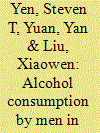|
|
|
Sort Order |
|
|
|
Items / Page
|
|
|
|
|
|
|
| Srl | Item |
| 1 |
ID:
089551


|
|
|
|
|
| Publication |
2009.
|
| Summary/Abstract |
Consumption of beer, wine and spirits by men in China is investigated, using data from the 2006 China Health and Nutrition Survey. Censoring of consumption levels is accommodated by estimating a censored equation system, using quasi maximum-likelihood and copula methods which allow the specification of non-Gaussian error distributions. Findings suggest that a misspecified error distribution can obscure the effects of explanatory variables on alcohol consumption. The procedure produces very different empirical estimates from a more conventional (Gaussian) estimator. Income does not affect alcohol consumption, with socio-demographic factors such as education, employment, and marital status playing more definitive roles. Regional differences are also found.
|
|
|
|
|
|
|
|
|
|
|
|
|
|
|
|
| 2 |
ID:
101155


|
|
|
|
|
| Publication |
2010.
|
| Summary/Abstract |
The effect of cigarette smoking on self-reported or assessed health (SAH) has been considered in several studies, with some surprising results, but smoking behavior has received less attention in studies in countries like China, than in the United States and various European countries. In this manuscript the variation in an ordinal endogenous SAH variable is modeled with an ordinal endogenous cigarette smoking variable, using the copula approach to accommodate skewness in the error distribution. The treatment approach avoids several selection issues that could bias empirical estimates. The empirical model is estimated for a random sample of adult males from nine Chinese provinces in the 2006 China Health and Nutrition Survey. The results for our sample suggest that heavy smokers are more likely to report excellent health. Government and those in health policy might target heavy smokers with the message that quitting does result in benefits, keeping in mind that their own reported assessment of their health is itself a function of several factors.
|
|
|
|
|
|
|
|
|
|
|
|
|
|
|
|
| 3 |
ID:
078029


|
|
|
|
|
| Publication |
2007.
|
| Summary/Abstract |
A concentration index methodology to analyze the inequality in childhood malnutrition in China is outlined. Height-for-age z-score is used as a measure of childhood malnutrition. Using household survey data from nine Chinese provinces, we found that per capita household income, household head's education, urban residence and access to a bus stop are associated with lower malnutrition. Child's age has a nonlinear relationship with the malnutrition status. Income growth and access to public transportation are associated with less severe inequality, while rural-urban gap, provincial differentials, and unequal distribution of household head's education are associated with higher levels of inequality in childhood malnutrition. Gender is not relevant for either malnutrition status or inequality. Investments in infrastructure and welfare programs are recommended to ameliorate the inequality in childhood malnutrition
|
|
|
|
|
|
|
|
|
|
|
|
|
|
|
|
| 4 |
ID:
103419


|
|
|
|
|
| Publication |
2011.
|
| Summary/Abstract |
In the United States, nearly 17% of greenhouse gas emissions come from residential energy use. Increases in energy efficiency for the residential sector can generate significant energy savings and emissions reductions. Consumer labels, such as the US Environmental Protection Agency's ENERGY STAR, promote conservation by providing consumers with information on energy usage for household appliances. This study examines how the ENERGY STAR label affects consumer preferences for refrigerators. The results of an online survey of a national sample of adults suggest that consumers are, on average, willing to pay an extra $249.82-$349.30 for a refrigerator that has been awarded the ENERGY STAR label. Furthermore, the results provide evidence that respondent willingness-to-pay was motivated by both private (energy cost savings) and public (environmental) benefits.
|
|
|
|
|
|
|
|
|
|
|
|
|
|
|
|
|
|
|
|
|